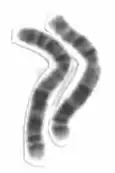2p15-16.1 microdeletion syndrome
| 2p15-16.1 microdeletion syndrome | |
|---|---|
| Other names | Monosomy 2p15-p16.1 |
 | |
| Chromosome 2(where deletion for this condition occurs) | |
| Specialty | Medical genetics |
2p15-16.1 microdeletion is an extremely rare genetic disorder caused by a small deletion in the short arm of human chromosome 2. First described in two patients in 2007,[1] by 2013 only 21 people have been reported as having the disorder in the medical literature.[2][3][4][5]
Presentation
Only 21 patients with 2p15-16.1 microdeletion have been described as of 2013. The clinical similarities between the individuals resulted in the classification of a new genetic syndrome.[1][2][3] The shared clinical features include moderate to severe intellectual disability and similar facial features including telecanthus, drooping eyelids, downslanting, short palpebral fissures, a prominent nasal bridge, high palate with long, smooth philtrum and an everted lower lip. Some of the patients also had feeding problems in infancy, microcephaly, optic nerve hypoplasia and hydronephrosis, wide-spaced nipples, short stature, cortical dysplasia, camptodactyly and pigeon toe.[1][2][3]
Cause

Three of the patients reported had a consistent proximal breakpoint on chromosome 2, but varying distal breakpoints.[1][2] The patients have 2p15–16.1 deletions of 5.7 megabases (Mb), 4.5 Mb, 3.9 Mb, 3.35Mb 3.3Mb and 570 kilobases, respectively.[4] In all 21 patients the deletions are de novo — neither parent possessed nor transmitted the mutation to the affected individual. One patient is a genetic mosaic, having some cells with the deletion and others without.[2]
Affected genes
The largest deletion encompasses approximately 15 protein-coding genes, 6 pseudogenes and a number of other as yet uncharacterised candidates, including:[2][6]
- AHSA2, activator of heat shock 90kDa protein ATPase homolog
- BCL11A, B-cell lymphoma/leukemia 11A
- C2orf74, Uncharacterized protein C2orf74
- FANCL, E3 ubiquitin-protein ligase FANCL
- KIAA1841, Uncharacterized protein KIAA1841
- PAPOLG, Poly(A) polymerase gamma
- PEX13, Peroxisomal membrane protein Peroxin-13
- PUS10, Pseudouridylate synthase 10
- REL, C-Rel proto-oncogene protein
- SNORA70B, small nucleolar RNA, H/ACA box 70B
- USP34, Ubiquitin carboxyl-terminal hydrolase 34
- VRK2, Serine/threonine-protein kinase VRK2
- XPO1, Exportin-1
Diagnosis
Treatment
References
- 1 2 3 4 Rajcan-Separovic E, Harvard C, Liu X, McGillivray B, Hall JG, Qiao Y, Hurlburt J, Hildebrand J, Mickelson EC, Holden JJ, Lewis ME (2007). "Clinical and molecular cytogenetic characterisation of a newly recognised microdeletion syndrome involving 2p15-16.1". J Med Genet. 44 (4): 269–76. doi:10.1136/jmg.2006.045013. PMC 2598046. PMID 16963482.
- 1 2 3 4 5 6 de Leeuw N, Pfundt R, Koolen DA, Neefs I, Scheltinga I, Mieloo H, Sistermans EA, Nillesen W, Smeets DF, de Vries BB, Knoers NV (2008). "A newly recognised microdeletion syndrome involving 2p15p16.1: narrowing down the critical region by adding another patient detected by genome wide tiling path array comparative genomic hybridisation analysis". J Med Genet. 45 (2): 122–4. doi:10.1136/jmg.2007.054049. PMID 18245392. S2CID 972258.
- 1 2 3 Chabchoub E, Vermeesch JR, de Ravel T, de Cock P, Fryns JP (2008). "The facial dysmorphy in the newly recognised microdeletion 2p15-p16.1 refined to a 570 kb region in 2p15". J Med Genet. 45 (3): 189–92. doi:10.1136/jmg.2007.056176. PMID 18310269. S2CID 32961901.
- 1 2 Liang JS, Shimojima K, Ohno K, Sugiura C, Une Y, Ohno K, et al. (2009). "A newly recognised microdeletion syndrome of 2p15-16.1 manifesting moderate developmental delay, autistic behaviour, short stature, microcephaly, and dysmorphic features: a new patient with 3.2 Mb deletion". J Med Genet. 46 (9): 645–7. doi:10.1136/jmg.2008.059220. PMID 19724011. S2CID 5128199.
- ↑ Félix TM, Petrin AL, Sanseverino MT, Murray JC (2010). "Further characterization of microdeletion syndrome involving 2p15-p16.1". Am J Med Genet A. 152A (10): 2604–8. doi:10.1002/ajmg.a.33612. PMC 2946431. PMID 20799320.
- ↑ "2p15-16.1 microdeletion syndrome". Wellcome Trust Sanger Institute. Retrieved 24 May 2011.
External links
- DECIPHER database entry for 2p15-16.1 microdeletion syndrome
- Orphanet entry for 2p15-16.1 microdeletion syndrome
- Online Mendelian Inheritance in Man (OMIM): 612513